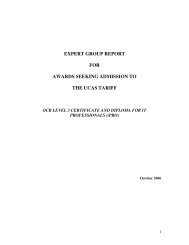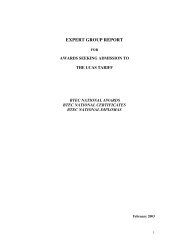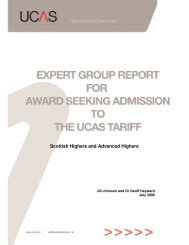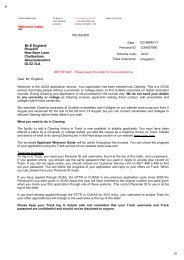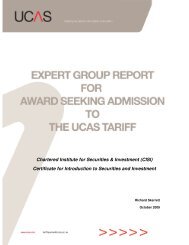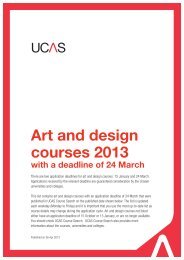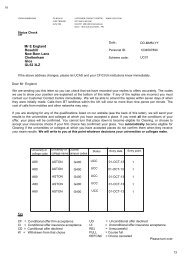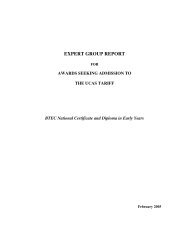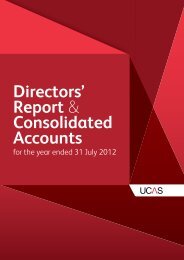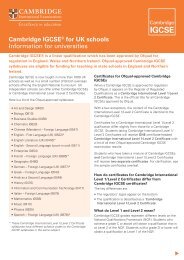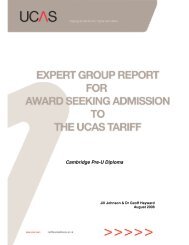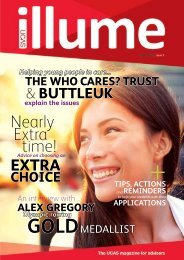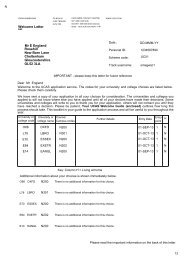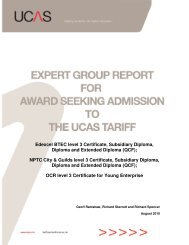International qualifications 2013 (pdf) - CUKAS
International qualifications 2013 (pdf) - CUKAS
International qualifications 2013 (pdf) - CUKAS
Create successful ePaper yourself
Turn your PDF publications into a flip-book with our unique Google optimized e-Paper software.
Qualifications currently offered<br />
duration of the Hojere Forberedelseseksamen (HF). A separate<br />
diploma will be issued.<br />
Egypt<br />
EVALUATION<br />
Thanaweya A’ama (General Secondary School Certificate)<br />
Al-Azhar General Secondary School Certificate<br />
Acceptable at 70% or better in lieu of GCSE on a subject for<br />
subject basis (except English Language).<br />
Will need to be supplemented by acceptable <strong>qualifications</strong> that<br />
are widely used for entry to HE, eg GCE or SQA awards.<br />
Diploma (Two years)<br />
Comparable to the BTEC National Diploma.<br />
GRADING SYSTEM<br />
The minimum pass mark is 40% except for Arabic and religion,<br />
where 50% is required.<br />
EDUCATION SYSTEM<br />
All school education is under the centralised control of the<br />
Ministry of Education. A nine-year system of ‘basic education’ is<br />
followed by three years of secondary education culminating in the<br />
School Certificate examination in 13 subjects.<br />
Candidates are required to take the examination over two years.<br />
The second and third years of secondary education are<br />
considered as two stages of the Thanaweya A’ama. There is a<br />
core of compulsory courses plus electives, which must include at<br />
least one course from arts and one from science, chosen<br />
according to the student’s intended career. The medium of<br />
instruction is Arabic apart from language schools which use both<br />
Arabic and English.<br />
Al-Azhar schools are open only to Muslim children and place<br />
additional emphasis on religious education. Boys and girls are<br />
strictly segregated. Completion of secondary education leads to<br />
the award of the Al-Azhar General Secondary Certificate.<br />
ACCESS TO HIGHER EDUCATION<br />
Entry to university in Egypt is based on the results of the School<br />
Certificate and is highly competitive. An average mark of 70–75%<br />
is required to meet matriculation requirements and some<br />
university faculties (eg engineering and medicine) may demand<br />
higher grades. The first degree may take from four to six years<br />
depending upon specialisation.<br />
Eritrea<br />
EVALUATION<br />
Eritrean Secondary Education Certificate Examinations (ESECE)<br />
– a standard Matriculation examination given to high school<br />
(grade 12) completed students. The ESECE is at the moment<br />
serving as high school leaving examination and at the same time<br />
as an entrance examination to post-secondary institutions of<br />
higher education (IHE) in the country.<br />
GRADING SYSTEM<br />
All subjects in the ESECE are marked as a percentage and<br />
grades are then assigned as follows:<br />
A 75 – 100 excellent<br />
B 65 – 74 very good<br />
C 50 – 64 good<br />
D 40 – 49 satisfactory<br />
F below 40 fail<br />
EDUCATION SYSTEM<br />
The National Board for Higher Education (NBHE) is the body<br />
mandated to oversee and manage the overall policies on higher<br />
education in the country. Recently the NBHE has been made to<br />
function under the Ministry of Education. The current system of<br />
education in the country follows the 5 + 3 + 4 system (five years<br />
of elementary education, three years of middle school education<br />
and four years of high school education). Students may opt to join<br />
technical and vocational schools after completing grade 10. At<br />
primary school level students are taught in their mother language<br />
but also take English as a language from the very beginning.<br />
After completing elementary education, however, the medium of<br />
instruction at all levels is English.<br />
ACCESS TO HIGHER EDUCATION<br />
Higher education in Eritrea is under the jurisdiction of the NBHE,<br />
which is again encompassed under the Ministry of Education. The<br />
national examination, the ESECE, is conducted and administered<br />
by the NBHE after students complete their high school (grade 12)<br />
education. Students are therefore admitted to the various<br />
institutions of higher education in the country at degree and<br />
diploma levels on the basis of the grades they earn in the<br />
national exam (ESECE). Admission to highly competitive fields of<br />
specialisation like medicine, pharmacy, engineering, computer<br />
science, law, etc. might require higher grades in the ESECE.<br />
Access to higher education has improved during the last five to<br />
six years with the opening of new IHE but remains limited.<br />
Female and blind students are admitted to IHE with a grade one<br />
scale lower than the other students in order to encourage blind<br />
students and increase the percentage of female students in IHE,<br />
which remains about 25% currently.<br />
A bachelor’s degree is the first degree offered by IHE after a<br />
student earns between 140-145 credit hours in an IHE about 4<br />
years (8 semesters) after passing the ESECE. Bachelor’s degrees<br />
in engineering, pharmacy and law (LLB) require between 175-<br />
180 credit hours in 5 years (10 semesters). This degree is<br />
considered to be a standard degree by western standards and<br />
students earning bachelor’s degrees from IHE in Eritrea are<br />
directly enrolled in postgraduate programmes in Europe, USA,<br />
Canada and other Middle East and African universities. MD<br />
degrees in medicine and dentistry require eight years and<br />
qualifying exams are given to students from partner universities<br />
in the west in addition to the rigorous evaluation system used in<br />
the School of Medicine and Dentistry every semester.<br />
Estonia<br />
EVALUATION<br />
Riigieksamid (National examinations)<br />
Gümnaasiumi lõputunnistus (Secondary School Leaving<br />
Certificate)<br />
Passes in five graduation examinations (a minimum of three<br />
being from national examinations) may be considered acceptable<br />
as satisfying general entrance requirements of UK HEIs (with the<br />
exclusion of English language proficiency requirement).<br />
INTERNATIONAL QUALIFICATIONS 19



